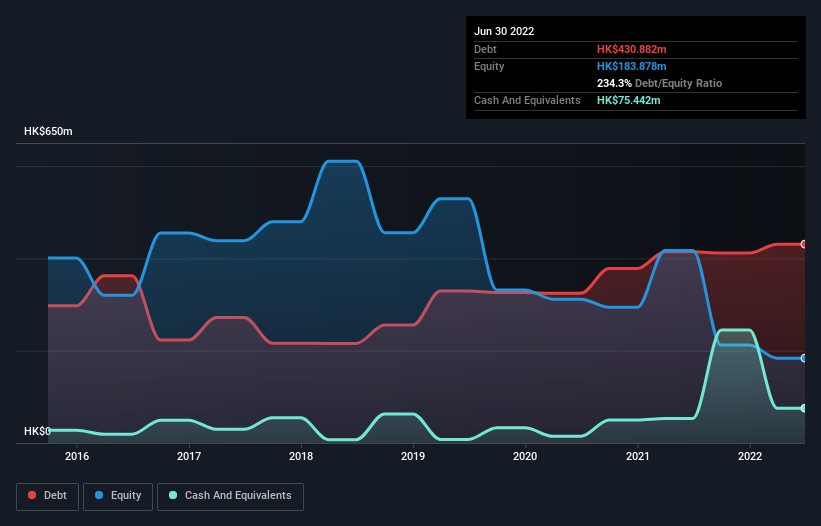Kiu Hung International Holdings (HKG:381) Takes On Some Risk With Its Use Of Debt

Warren Buffett famously said, 'Volatility is far from synonymous with risk.' So it seems the smart money knows that debt - which is usually involved in bankruptcies - is a very important factor, when you assess how risky a company is. We can see that Kiu Hung International Holdings Limited (HKG:381) does use debt in its business. But should shareholders be worried about its use of debt?
Why Does Debt Bring Risk?
Generally speaking, debt only becomes a real problem when a company can't easily pay it off, either by raising capital or with its own cash flow. Part and parcel of capitalism is the process of 'creative destruction' where failed businesses are mercilessly liquidated by their bankers. However, a more usual (but still expensive) situation is where a company must dilute shareholders at a cheap share price simply to get debt under control. By replacing dilution, though, debt can be an extremely good tool for businesses that need capital to invest in growth at high rates of return. When we examine debt levels, we first consider both cash and debt levels, together.
View our latest analysis for Kiu Hung International Holdings
What Is Kiu Hung International Holdings's Net Debt?
As you can see below, Kiu Hung International Holdings had HK$430.9m of debt, at June 2022, which is about the same as the year before. You can click the chart for greater detail. However, it does have HK$75.4m in cash offsetting this, leading to net debt of about HK$355.4m.

How Healthy Is Kiu Hung International Holdings' Balance Sheet?
The latest balance sheet data shows that Kiu Hung International Holdings had liabilities of HK$636.1m due within a year, and liabilities of HK$83.9m falling due after that. Offsetting this, it had HK$75.4m in cash and HK$73.4m in receivables that were due within 12 months. So it has liabilities totalling HK$571.0m more than its cash and near-term receivables, combined.
This deficit casts a shadow over the HK$304.1m company, like a colossus towering over mere mortals. So we definitely think shareholders need to watch this one closely. After all, Kiu Hung International Holdings would likely require a major re-capitalisation if it had to pay its creditors today.
We use two main ratios to inform us about debt levels relative to earnings. The first is net debt divided by earnings before interest, tax, depreciation, and amortization (EBITDA), while the second is how many times its earnings before interest and tax (EBIT) covers its interest expense (or its interest cover, for short). Thus we consider debt relative to earnings both with and without depreciation and amortization expenses.
Weak interest cover of 0.20 times and a disturbingly high net debt to EBITDA ratio of 7.7 hit our confidence in Kiu Hung International Holdings like a one-two punch to the gut. This means we'd consider it to have a heavy debt load. One redeeming factor for Kiu Hung International Holdings is that it turned last year's EBIT loss into a gain of HK$8.8m, over the last twelve months. When analysing debt levels, the balance sheet is the obvious place to start. But you can't view debt in total isolation; since Kiu Hung International Holdings will need earnings to service that debt. So when considering debt, it's definitely worth looking at the earnings trend. Click here for an interactive snapshot.
Finally, a company can only pay off debt with cold hard cash, not accounting profits. So it's worth checking how much of the earnings before interest and tax (EBIT) is backed by free cash flow. Happily for any shareholders, Kiu Hung International Holdings actually produced more free cash flow than EBIT over the last year. There's nothing better than incoming cash when it comes to staying in your lenders' good graces.
Our View
On the face of it, Kiu Hung International Holdings's interest cover left us tentative about the stock, and its level of total liabilities was no more enticing than the one empty restaurant on the busiest night of the year. But at least it's pretty decent at converting EBIT to free cash flow; that's encouraging. We're quite clear that we consider Kiu Hung International Holdings to be really rather risky, as a result of its balance sheet health. So we're almost as wary of this stock as a hungry kitten is about falling into its owner's fish pond: once bitten, twice shy, as they say. There's no doubt that we learn most about debt from the balance sheet. But ultimately, every company can contain risks that exist outside of the balance sheet. For example, we've discovered 4 warning signs for Kiu Hung International Holdings (3 are potentially serious!) that you should be aware of before investing here.
When all is said and done, sometimes its easier to focus on companies that don't even need debt. Readers can access a list of growth stocks with zero net debt 100% free, right now.
If you're looking to trade AOM International Group, open an account with the lowest-cost platform trusted by professionals, Interactive Brokers.
With clients in over 200 countries and territories, and access to 160 markets, IBKR lets you trade stocks, options, futures, forex, bonds and funds from a single integrated account.
Enjoy no hidden fees, no account minimums, and FX conversion rates as low as 0.03%, far better than what most brokers offer.
Sponsored ContentNew: Manage All Your Stock Portfolios in One Place
We've created the ultimate portfolio companion for stock investors, and it's free.
• Connect an unlimited number of Portfolios and see your total in one currency
• Be alerted to new Warning Signs or Risks via email or mobile
• Track the Fair Value of your stocks
Have feedback on this article? Concerned about the content? Get in touch with us directly. Alternatively, email editorial-team (at) simplywallst.com.
This article by Simply Wall St is general in nature. We provide commentary based on historical data and analyst forecasts only using an unbiased methodology and our articles are not intended to be financial advice. It does not constitute a recommendation to buy or sell any stock, and does not take account of your objectives, or your financial situation. We aim to bring you long-term focused analysis driven by fundamental data. Note that our analysis may not factor in the latest price-sensitive company announcements or qualitative material. Simply Wall St has no position in any stocks mentioned.
About SEHK:381
AOM International Group
An investment holding company, manufactures and trades in toys and gifts.
Mediocre balance sheet low.
Market Insights
Community Narratives



